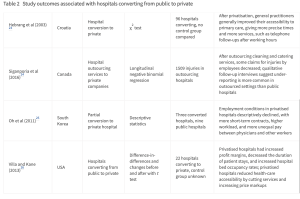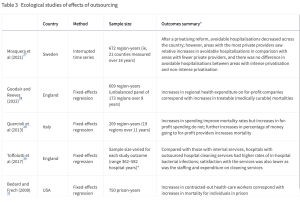Privatisation of healthcare results in a reduction in quality of care according to a review paper published this week (1 March 2024) in The Lancet. The study’s authors from the University of Oxford, concluded that:
“At the very least, health-care privatisation has almost never had a positive effect on the quality of care.”
Adding that their review:
“provides evidence that challenges the justifications for healthcare privatisation and concludes that the scientific support for further privatisation of health-care services is weak.”
The published review looked at studies made of healthcare systems in eight high-income countries, where privatisation has been taking place over the past 40 years. Studies included those from the UK, USA, Canada, South Korea, Germany, Sweden, Croatia and Italy.
The review aimed to assess whether the often-stated aim of privatisation – to improve the quality of care through market competition – did indeed occur. Or, is the impact negligible, or in fact to worsen the quality of care due to the profit-driven nature of the organisations.
The study included longitudinal studies – those performed over time – which although small in number provided some of the most useful information. The researchers found a consistent picture of privatisation adversely affecting the quality of care. In these studies, they found that although outsourcing can reduce costs, this was at the expense of standards.
Although an assessment of the financial changes that privatisation brought about was not a primary aim of the study, the researchers did find that hospitals moving from public to private ownership status tended to make higher profits than public hospitals that did not convert. The primary way this happened, however, was through the selective intake of patients and reductions in staff numbers.
The review also has implications for all the theoretical arguments made in favour of privatisation in many areas, noted the authors, as their evidence “does not align with the expectations of mixed markets, namely that they would improve quality by increasing competition.”
It was not just profit-driven companies that were studied, transition to not-for-profit private organisations was also found to frequently have a detrimental effect on the quality of care, although to a lesser extent than moving to for-profit provision.
The authors noted that there will always be issues with the studies that have been carried out over in this area. They tend to focus on inpatient care, and there are very few studies on other aspects of health care such as community, primary, and ambulatory care. The studies also tend to look at staffing levels and are often missing public and patient perceptions of the services provided.
The Lancet review is not the first to look at the effect of private ownership on the quality of care in healthcare. Last August the BMJ published a systematic review – Evaluating trends in private equity ownership and impacts on health outcomes, costs, and quality – which looked at the takeover of healthcare services by private equity funds, and found that ownership by private equity companies is associated with a worse quality of care and higher costs. This review did not look at privatisation of public-owned healthcare, but, rather a change to a different type of private company ownership, one that was focused on short-term profit.
The authors of the review, which was led by the University of Chicago, found that private equity ownership was “most consistently associated with increases in costs to patients or payers” and was “associated with mixed to harmful impacts on quality.” Furthermore, the review identified “no consistently beneficial impacts of PE ownership.”
Taken together the two reviews provide good evidence that taking publicly-run services, such as those of the NHS, out of public hands and into the private sector is a bad move for quality of care, even if the organisation is run on a not-for-profit basis.


Dear Reader,
If you like our content please support our campaigning journalism to protect health care for all.
Our goal is to inform people, hold our politicians to account and help to build change through evidence based ideas.
Everyone should have access to comprehensive healthcare, but our NHS needs support. You can help us to continue to counter bad policy, battle neglect of the NHS and correct dangerous mis-infomation.
Supporters of the NHS are crucial in sustaining our health service and with your help we will be able to engage more people in securing its future.
Please donate to help support our campaigning NHS research and journalism.


